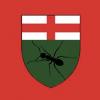- Formiculture.com
- Forums
- Gallery
- Members
- Member Map
- Chat

Formica pratensis - founding a colony
Started By
Lisberg
, May 30 2021 1:09 PM
5 replies to this topic
#1
 Offline
-
Posted May 30 2021 - 1:09 PM
Offline
-
Posted May 30 2021 - 1:09 PM
Once more I'm trying to keep ants - as did the last few years I've been hunting and trying to get my hands in one of the two Danish species of camponotus with some luck, but the colonies never make it past the initial foundation state .. so I've decided to go a different way
Truth be told I like mostly big ants, I find them fascinating, but since I've had no luck with camponotus I got the next best thing Denmark has to offer. Formica...
Formica pratensis to be correct, I found two queens two weeks ago, and I kept them in a homemade acrylic container with some fin mesh between them (to let them smell/know eachother)
Then one week ago I won't to the woods and found some Formica Rufa pupa and 4 works (2 small and 2 big).. it introduced the queens and they instantly set their mounts together and ran their antennas all over each other (slowly)
With that success, I added the 4 ants and pupa to the queens and let them get to know each other...
This morning they are all still doing fine, but I saw there was still no eggs from my queens but 2 of the pupa had hatched - so I went back to the woods and was planning to go for a little more pupa from the same anthill - on the way home I found 4 new Formica pratensis and I took them with me - they have now been added to the setup and all looks good, they are all sitting together and running their antennae all over each other - the ants seems to accept all of them as their queens... I will take some pictures tomorrow
Do anyone know if this is the correct approach to get my new queens to lay eggs - as far as I can tell multiple Formica pratensis queens in not unheard off
- Lisberg
Truth be told I like mostly big ants, I find them fascinating, but since I've had no luck with camponotus I got the next best thing Denmark has to offer. Formica...
Formica pratensis to be correct, I found two queens two weeks ago, and I kept them in a homemade acrylic container with some fin mesh between them (to let them smell/know eachother)
Then one week ago I won't to the woods and found some Formica Rufa pupa and 4 works (2 small and 2 big).. it introduced the queens and they instantly set their mounts together and ran their antennas all over each other (slowly)
With that success, I added the 4 ants and pupa to the queens and let them get to know each other...
This morning they are all still doing fine, but I saw there was still no eggs from my queens but 2 of the pupa had hatched - so I went back to the woods and was planning to go for a little more pupa from the same anthill - on the way home I found 4 new Formica pratensis and I took them with me - they have now been added to the setup and all looks good, they are all sitting together and running their antennae all over each other - the ants seems to accept all of them as their queens... I will take some pictures tomorrow
Do anyone know if this is the correct approach to get my new queens to lay eggs - as far as I can tell multiple Formica pratensis queens in not unheard off
- Lisberg
#2
 Offline
-
Posted May 30 2021 - 1:53 PM
Offline
-
Posted May 30 2021 - 1:53 PM
Welcome back!
"The ants are a people not strong, yet they prepare their meat in the summer." Prov. 30:25
Keep ordinary ants in extraordinary ways.
Keep ordinary ants in extraordinary ways.
#3
 Offline
-
Posted May 30 2021 - 2:08 PM
Offline
-
Posted May 30 2021 - 2:08 PM
Wait, is Formica pratensis and Formica rufa not protected by EU law?
Edit: By the way, if you do not care about the legality, giving them Formica rufa as hosts won't work, they need something from serviformica like Formica fusca or Formica cunicularia. Also, polygynous F. pratensis colonies were only recorded from Germany and not Denmark
Edited by NPLT, May 30 2021 - 2:38 PM.
#4
 Offline
-
Posted May 30 2021 - 2:56 PM
Offline
-
Posted May 30 2021 - 2:56 PM
it depends on the country i think.Wait, is Formica pratensis and Formica rufa not protected by EU law?
Edited by Manitobant, May 30 2021 - 2:57 PM.
My journals:
Polyergus Mexicanus: https://www.formicul...gs/#entry175528
Lasius minutus: https://www.formicul...cs/#entry174811
Lasius latipes: https://www.formicul...gs/#entry206449
General acanthomyops journal: https://www.formicul...yops-with-eggs/
Polyergus Mexicanus: https://www.formicul...gs/#entry175528
Lasius minutus: https://www.formicul...cs/#entry174811
Lasius latipes: https://www.formicul...gs/#entry206449
General acanthomyops journal: https://www.formicul...yops-with-eggs/
#5
 Offline
-
Posted May 30 2021 - 9:22 PM
Offline
-
Posted May 30 2021 - 9:22 PM
Welcome back!
Thank you, i've been reading a lot of journals and post inhere, but now i really want to succeed in founding and keeping a colony ![]()
Wait, is Formica pratensis and Formica rufa not protected by EU law?
Edit: By the way, if you do not care about the legality, giving them Formica rufa as hosts won't work, they need something from serviformica like Formica fusca or Formica cunicularia. Also, polygynous F. pratensis colonies were only recorded from Germany and not Denmark
it depends on the country i think.Wait, is Formica pratensis and Formica rufa not protected by EU law?
Before I decided to keep the queens, I called the Danish agency that handles these matters, and they said "If you find a queen in the open, you can take them as long as you intent to keep the alive and give them a good life, as long as you don't take lets say 100".. So i asked about if I was allowed to find brood elsewhere to give to them; "You are not allowed to destroy a nest or anthill no matter what species the ant belongs too, but you are allowed to in a gently way, to remove the top 10 cm of an anthill and look for eggs and pupa, as long as you don't use chemicals, force or harm the ants in anyway - they can rebuild the anthill, and you'll never get all the brood"
So I don't think it is illegal if done in a respectful way. ?
About it being the "wrong" species, the queens and the "adopted" ants are getting alone fine, and the queens are guarding the pupae, but not harming them? so time will tell if this will still succeed - I saw a worker bring food to the queens so it look like the got what they need ?
And just because it has only been recorded in Germany doesn't really exclude it from Danish ants - it might just not have been observed ? ![]()
Thanks for your input and I hope to learn more from this amazing forum !
#6
 Offline
-
Posted May 31 2021 - 7:43 AM
Offline
-
Posted May 31 2021 - 7:43 AM
Welcome back!
Thank you, i've been reading a lot of journals and post inhere, but now i really want to succeed in founding and keeping a colony
Wait, is Formica pratensis and Formica rufa not protected by EU law?
Edit: By the way, if you do not care about the legality, giving them Formica rufa as hosts won't work, they need something from serviformica like Formica fusca or Formica cunicularia. Also, polygynous F. pratensis colonies were only recorded from Germany and not Denmark
it depends on the country i think.Wait, is Formica pratensis and Formica rufa not protected by EU law?
Before I decided to keep the queens, I called the Danish agency that handles these matters, and they said "If you find a queen in the open, you can take them as long as you intent to keep the alive and give them a good life, as long as you don't take lets say 100".. So i asked about if I was allowed to find brood elsewhere to give to them; "You are not allowed to destroy a nest or anthill no matter what species the ant belongs too, but you are allowed to in a gently way, to remove the top 10 cm of an anthill and look for eggs and pupa, as long as you don't use chemicals, force or harm the ants in anyway - they can rebuild the anthill, and you'll never get all the brood"
So I don't think it is illegal if done in a respectful way. ?
About it being the "wrong" species, the queens and the "adopted" ants are getting alone fine, and the queens are guarding the pupae, but not harming them? so time will tell if this will still succeed - I saw a worker bring food to the queens so it look like the got what they need ?
And just because it has only been recorded in Germany doesn't really exclude it from Danish ants - it might just not have been observed ?
Thanks for your input and I hope to learn more from this amazing forum !
Nice that you got so laid back agency, here in Poland they're fully protected and I could get fines or even jail time for collecting them ( which is a shame because I was finding them all May ). And I got the information about polygnous colonies present only in Denmark from AntWiki, " A polygynous form with many grouped nests, occurs locally in Germany and the Netherlands, often in shaded woodland, but has not been recorded from Denmark or Fennoscandia.". But hopefully that's just a issue of not-finding them, rather than not-existing.
In any case, good luck.
0 user(s) are reading this topic
0 members, 0 guests, 0 anonymous users

















